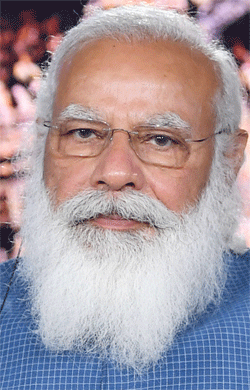New Delhi: In a meeting chaired by PM Narendra Modi, an important decision of allowing vaccination to everyone above the age of 18 from 1May has been taken.
PM said that the Government has been working hard from over a year to ensure that maximum numbers of Indians are able to get the vaccine in the shortest possible of time. He added that India is vaccinating people at world record pace& we will continue this with even greater momentum.
India’s National Covid-19 Vaccination Strategy has been built on a systematic and strategic end-to-end approach, proactively building capacity across R&D, Manufacturing and Administration since April 2020. While pushing for scale and speed, it has simultaneously been anchored in the stability necessary to sustainably execute the World’s Largest Vaccination Drive.
India’s approach has been built on scientific and epidemiological pillars, guided by Global Best Practices, SoPs of WHO as well as our India’s foremost experts in the National Expert Group on Vaccine Administration for Covid-19 (NEGVAC).
India has been following a dynamic mapping model based on availability of vaccines & coverage of vulnerable priority groups to take decisions of when to open up vaccinations to other age-groups. A good amount of coverage of vulnerable groups is expected by 30th April.
Phase-I of the National Covid-19 Vaccination Strategy was launched on 16th January 2021, prioritizing protection for our protectors, our Health Care Workers (HCWs) and Front Line Workers (FLWs). As systems and processes stabilized, Phase-II was initiated from 1 March 2021, focusing on protecting our most vulnerable i.e. all people above 45 years of age, accounting for more than 80% Covid mortality in the country. The private sector was also roped in to augment capacity.
As per PM Modi’s directions, Government of India has proactively engaged and coordinated with stakeholders across the spectrum, from research institutes to national and international manufacturers, global regulators etc. The strength of India’s private sector vaccine manufacturing capability has been strategically empowered through unprecedented decisive steps, from facilitating public-private collaborative research, trials and product development, to targeted public grants and far-reaching governance reforms in India’s regulatory system. Government of According to PM Modi’s instructions, India is in regular touch with each manufacturer, including having sent multiple inter-ministerial teams on site, to understand each one’s requirements and provide proactive and customized support in the form of grants, advance payments, more sites for production, etc to ramp up vaccine production.
This has resulted in Emergency Use Authorisation being granted to two indigenously manufactured vaccines (Serum Institute of India and Bharat Biotech), and a third vaccine (Sputnik) that while presently manufactured abroad will eventually be manufactured in India.
Government of India has roped in the private sector in the vaccination drive right from the beginning. Now, as capabilities and processes have stabilized, the public as well as private sector has the experience and confidence to rapidly scale up.
In its Phase-III, the National Vaccine Strategy aims at liberalised vaccine pricing and scaling up of vaccine coverage. This would augment vaccine production as well as availability, incentivising vaccine manufacturers to rapidly ramp up their production as well as attract new vaccine manufacturers, domestic and international. It would also make pricing, procurement, eligibility and administration of vaccines open and flexible, allowing all stakeholders the flexibility to customise to local needs and dynamics.


